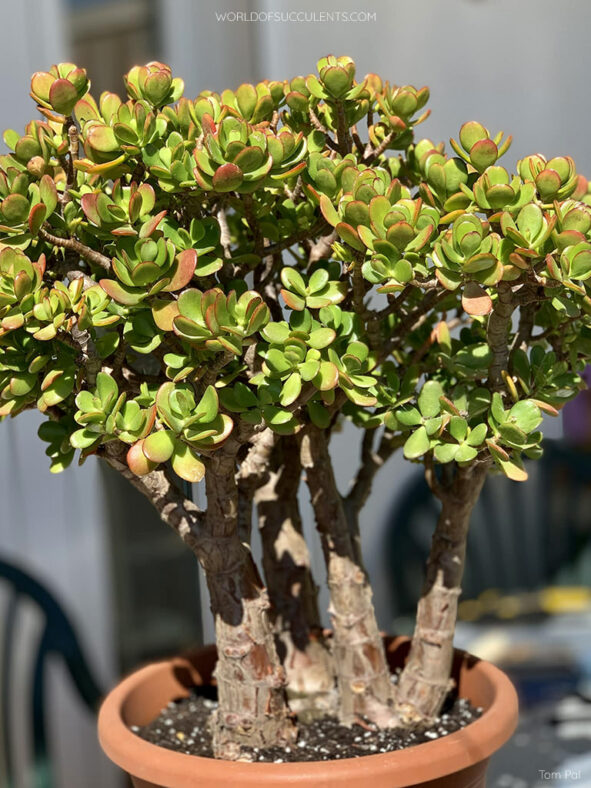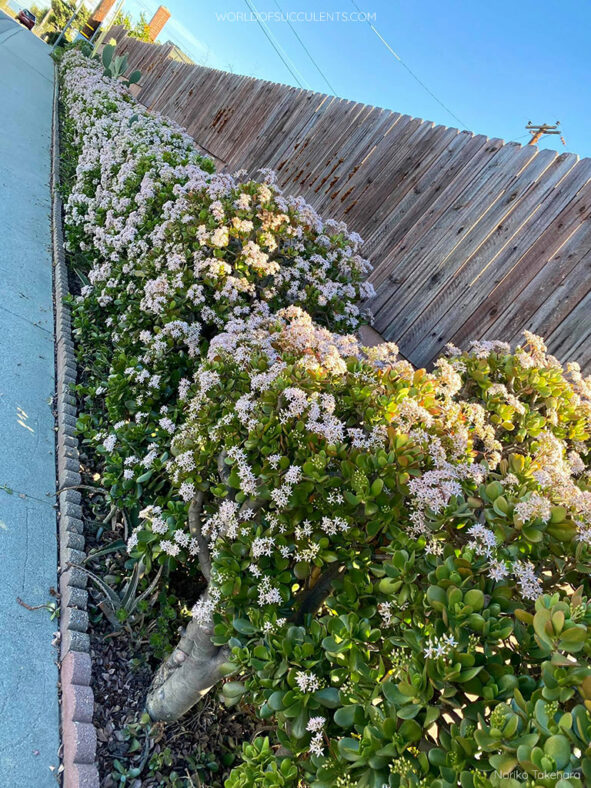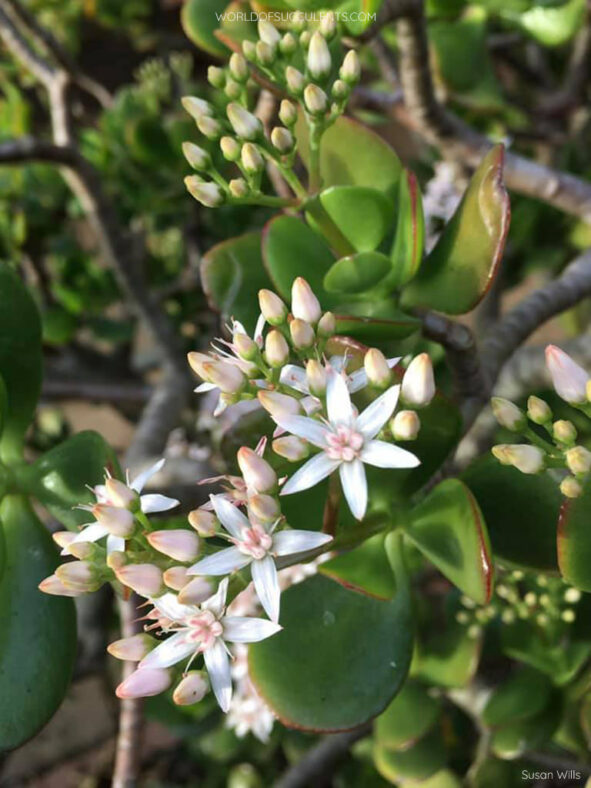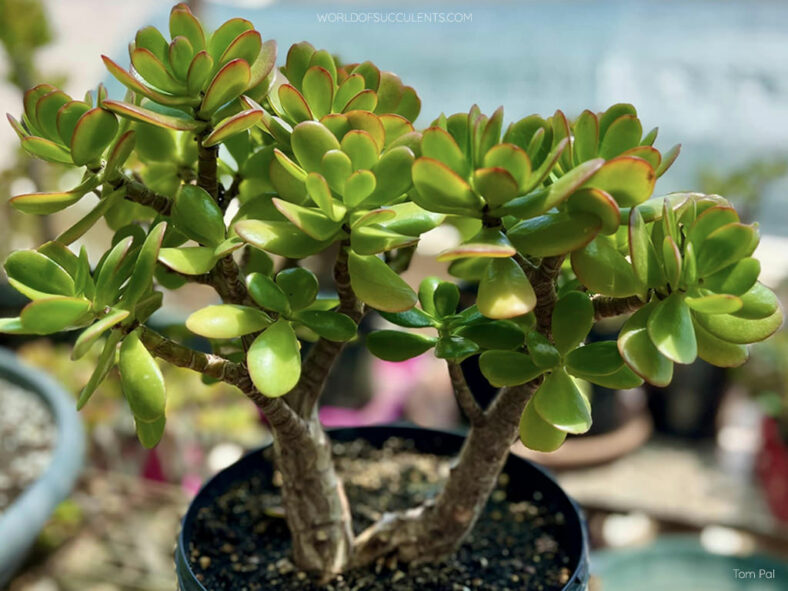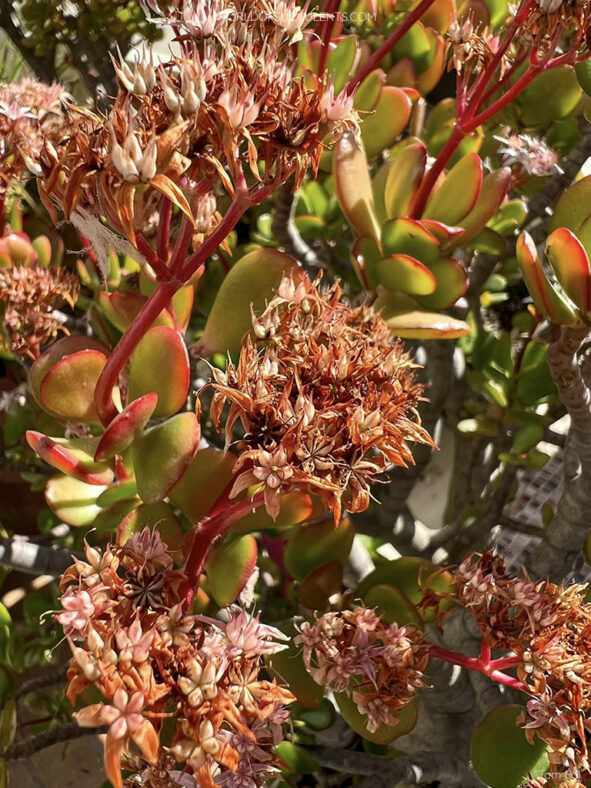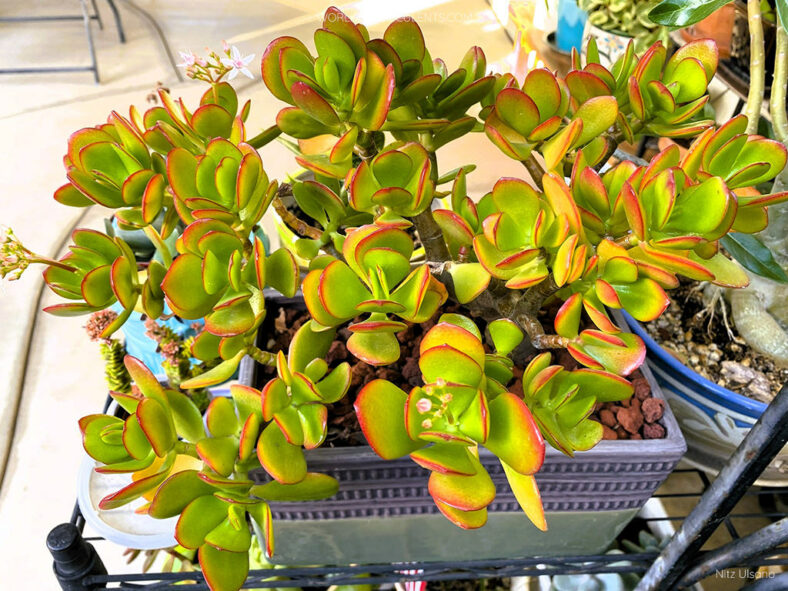Crassula ovata is probably one of the most popular succulents in the genus Crassula. It is commonly seen as a houseplant worldwide and is also a popular bonsai subject. Numerous attractive cultivars that vary in leaf size, shape, and color are available.
Scientific Name
Crassula ovata (Miller) Druce
Common Name(s)
Chinese Rubber, Dollar Plant, Dwarf Rubber, Friendship Tree, Jade Plant, Jade Tree, Japanese Rubber, Lucky Plant, Money Plant, Money Tree, Pink Joy
Synonym(s)
Cotyledon ovata, Crassula argentea, Crassula portulacea, Toelkenia ovata
Scientific Classification
Family: Crassulaceae
Subfamily: Crassuloideae
Genus: Crassula
Etymology
The specific epithet "ovata (oh-VAY-tuh)" means "ovate, egg-shaped" and refers to the shape of the leaves.
Origin
This species is native to South Africa. It usually grows on rocky slopes from Swartberg mountains in the Western Cape province to KwaZulu-Natal.
Description
Crassula ovata is a succulent shrub with branches bearing green leaves, often reddish at the sharply-edged margins. It can grow up to 8.2 feet (2.5 m) tall, with a single main stem or sparingly branched at the base. The branches are succulent, grey-green, and become woody as they mature, with scars of the fallen leaves and older bark peeling in horizontal brownish strips. The main stem can reach 8 inches (20 cm) in diameter. The leaves are thick and fleshy, range from obovate or broadly elliptical to spoon-shaped, and can measure up to 3.6 inches (9 cm) long and 1.6 inches (4 cm) wide. They are usually stalkless and grow in opposite pairs along the branches, with old leaves deciduous.
During the winter, mature plants produce star-shaped flowers in compact, round-topped terminal clusters on stalks up to 1.2 inches (3 cm) long. The flowers are 5-merous, white, often tinged pink, and can reach up to 0.8 inches (2 cm) in diameter. The fruits are small capsules that contain tiny brown seeds.
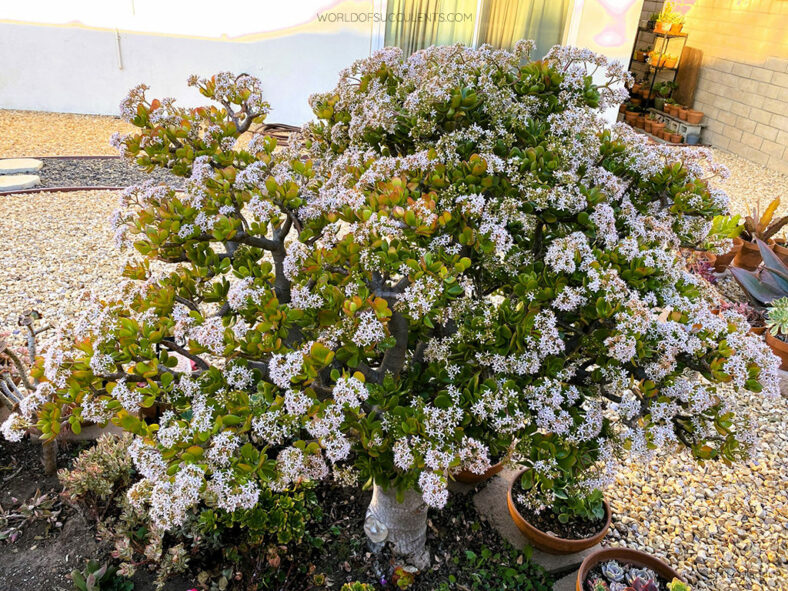
How to Grow and Care for Crassula ovata
Light: This plant needs about 4 to 6 hours of direct sunlight daily to thrive. While it can survive in partial shade, it requires direct sunlight for flowering. If you keep it indoors, place it in a bright spot.
Soil: For optimal growth, use well-draining soil when planting Crassula ovata. You can use commercial potting soil mixes specially designed for succulents or make your own.
Hardiness: The plant can tolerate various temperatures and may even survive light frost. However, prolonged cold is usually fatal. Crassula ovata grows best in USDA Plant Hardiness Zones 10a to 11b, with average minimum winter temperatures ranging from 30 to 50 °F (-1.1 to 10 °C).
Watering: Proper watering is most important for this plant. Although it does not need frequent watering, during the growing season, it requires deep watering when the soil is dry. It needs little water in the summer and even less in winter when it is semi-dormant.
Fertilizing: As a slow-growing plant, Crassula ovata does not require much fertilizer. However, it can benefit from a small amount of organic fertilizer in mid-spring when it starts actively growing.
Repotting: This plant can be left in a small pot as it does not mind being root-bound. However, it is best to repot it every two to three years or when it becomes top-heavy. The ideal time to repot is in spring when the new growth starts.
Propagation: Generally, Crassula ovata is propagated by stem cuttings or leaves. However, it can also be started from seeds. The fastest way to get a decent-sized plant is by using a stem cutting. Always take cuttings during the growing season. The best time to sow the seeds is in spring or summer.
Learn more at How to Grow and Care for Crassula.
Toxicity of Crassula ovata
Crassula ovata has been used as a medicinal plant in some regions. However, some sources suggest that it may be toxic to cats, dogs, and horses and mildly toxic to humans if ingested or if it comes in contact with the skin. These claims, however, have yet to be proven.
Forms and Cultivars of Crassula ovata
- Crassula ovata 'Crosby's Compact'
- Crassula ovata 'Didier Pocreau'
- Crassula ovata 'Gollum'
- Crassula ovata 'Gollum Variegata'
- Crassula ovata 'Hobbit'
- Crassula ovata 'Hummel's Sunset'
- Crassula ovata 'Hummel's Sunset Variegata'
- Crassula ovata 'Minima'
- Crassula ovata 'Obliqua'
- Crassula ovata 'Pink Beauty'
- Crassula ovata 'Skinny Fingers'
- Crassula ovata 'Tricolor'
Links
- Back to genus Crassula
- Succupedia: Browse succulents by Scientific Name, Common Name, Genus, Family, USDA Hardiness Zone, Origin, or cacti by Genus
Photo Gallery
Click on a photo to see a larger version.
